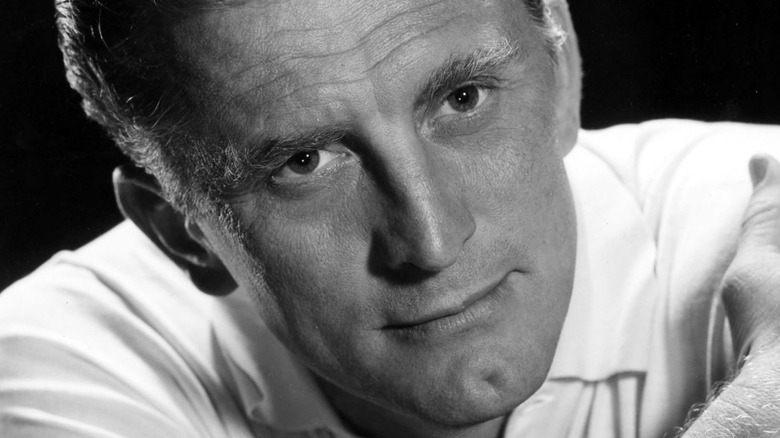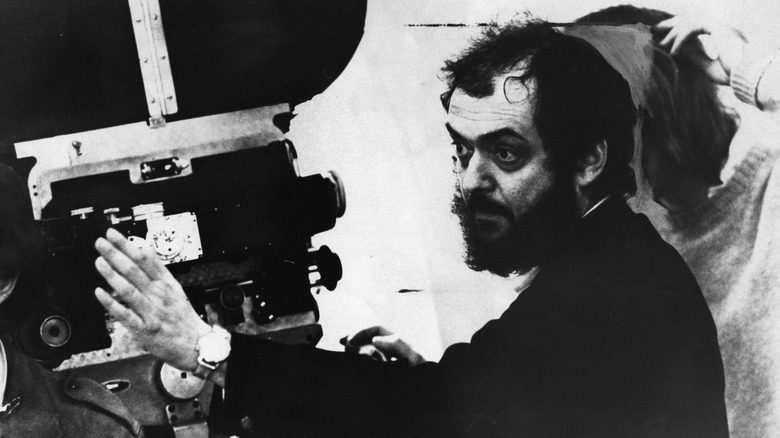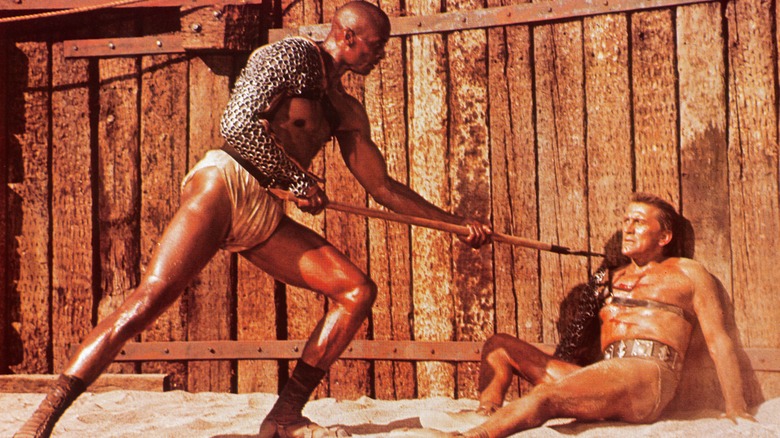Inside The Tense Relationship Between Kirk Douglas And Stanley Kubrick
Stanley Kubrick's reputation of being wildly pedantic and painstakingly controlling over virtually every detail in his films has survived him more than two decades after his death. Given his uncompromising devotion to creating an immaculate artistic product, it's no wonder he's still regarded as one of the greatest directors of all time. "I do not always know what I want, but I do know what I don't want," Kubrick once said (via Good Reads). Now, if you can imagine a team-up between the famed "Shining" director and perhaps the most versatile, influential actor of the past century, you might just find yourself beholding an unstoppable duo crafted in cinema heaven.
When Stanley Kubrick first met Kirk Douglas, the two seemed destined for unquestionable greatness, and if you've ever seen "Paths of Glory" (1957) or "Spartacus" (1960), you probably already know that they accomplished it more than once. However, that glory wasn't achieved without a few hiccups along the path. While the two undoubtedly managed to create some era-defining art together, there was some notably rancorous energy that defined much of their relationship. "He was a b******!" Douglas once shared with Variety while reflecting on the life of his old friend and collaborator. "But he was a talented, talented guy."
"Difficult? (Kubrick) invented the word," Douglas continued. ""But he was talented. So, we had lots of fights, but I always appreciated his talent."
'Paths of Glory'
In what BFI once called Stanley Kubrick's "first film of 'genius," the director (above) found himself working alongside Kirk Douglas for the very first time in 1956. According to Diabolique Magazine, Kubrick approached Douglas with plans to turn Humphrey Cobb's tragic and beautiful World War I novel into a Hollywood feature. Douglas was at the fore of his own production company, Bryna Productions, at the time, so he had both the talent and the financial resources to turn "Paths of Glory" into a reality. Before long, production was underway and Kubrick found himself conducting the titanic endeavor alongside one of the most celebrated film actors of the 20th century. There was only one problem: The two disagreed. They disagreed a lot.
Apparently, there were several details in the script that Kubrick and Douglas found themselves fighting over like two dogs tearing away at the same bone. Kubrick wanted to pivot Cobb's story toward a more benevolent, commercially appealing and happier ending to prompt widespread viewer reception. Douglas, on the other hand, felt that the anti-war message would be lost through such a gesture. They clashed all throughout production until finally, after holding out for as long as he could, Kubrick had no choice but to cave to the wishes of his executive producer and the star of the film. Luckily, the preservation of the story's original conclusion didn't dampen its reception, and "Paths of Glory" remains one of the crowning achievements in both Kubrick and Douglas's careers (via Diabolique Magazine).
Disagreements over Spartacus (1960)
Even those who haven't seen the epic 1960 film "Spartacus" probably recognize the film's timeless, iconic exclamation: "I am Spartacus!" However, if Kubrick had gotten his way, this line never would have appeared in the movie (imagine "Gladiator" without "Are you not entertained?!"). Yet again, Douglas found himself working alongside Kubrick when it was time to follow "Paths of Glory" up with "Spartacus" three years later, and yet again, the two failed to see eye-to-eye on some things. Variety reports that Kubrick abhorred the line and wanted no part of it in his film. Diabolique Magazine reports that Kubrick found the script "silly and melodramatic." However, Douglas again leveled some rigorous protestation at the director during the filming process, postulating that the line was key to the film's conclusion and absolutely needed to be preserved within the script.
Production of "Spartacus" became something of a Colosseum battle in and of itself. Arguments on set between Kubrick and Douglas became so heated — "rancorous and vindictive," as Diabolique Magazine characterizes them — that Douglas's wife reportedly suggested that the two attend counseling together (per Diabolique Magazine). Nevertheless, the project endured, and both Kubrick and Douglas had a new sensational achievement to add to their cinematic arsenals when "Spartacus" hit theaters. Against all odds, the two remained friends throughout the remainder of their lives, though creative differences never escaped their relationship. Even after Kubrick's death of a heart attack at age 70, Douglas managed to get a few jabs in, reportedly calling 1999's "Eyes Wide Shut" (Kubrick's final film, per IMDb) "the lousiest picture," according to Variety.


